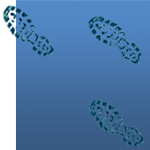|
New Orleans is a music town.
Pausing near a stairwell where an old man sawed feverishly on his fiddle the
way Tchaikovsky taught him, I asked myself why I was so enthralled. Stepping
aside for a passing parade of tubas, everyone did so with a smile because music
made them happy. Peeking over shoulders, I came across reggae done well with
different sized trash cans, and the giant "why?" kept up its rhythmic
chant.
I wasn't concerned with the "what"
of music, lord knows we have books and talking heads teaching us what music is.
We have even more instructing us how to make music. What struck me was the
variety and the universality. Crowds speaking every possible language tapped
their toes to the same beat, and I had to know why.
As much as I sometimes dance with
Puff, he does it for a biscuit, not the music appreciation. We say birds sing,
yet we know for them it is just a way to say, "I'm horny". As much as many of
our songs serve the same purpose, that is a recent application. Unlike animals,
we enjoy the music itself, dare I say, even need it.
Yet pleasure for all creatures is
tied to survival, some evolved stimulus like eating or procreating. Why did we
evolve music as this pleasurable experience so unique to our species? It goes
way beyond language and sending signals, which have clear purpose for us and
animals down to crickets.
Wandering Bourbon Street,
cogitating the recurring "why" without resolution, I was struck by the calming
effect of the music I passed, how each street performer reset the pounding
"why" in my head and replaced it with a refreshing pause. Continuing to shuffle
along between musical interludes, I went back to thinking, sometimes exploring
fresh paths due to the musical interruptions.
That's when the light started
flickering, glowing brighter as the pieces started to fit together. The pieces
came from a field of computers called parallel processing, and so I'd like to
present a hypothesis.
A bit of geeky background. A pocket
calculator can add a column of numbers far faster than we can, yet we can
recognize a coffee cup faster than a roomful of supercomputers. How do we do
this with wetware (neurons, axons, synapses, et al) that run individually so
much slower than semiconductors? We do this by parceling out the task, by
delegating parts of the job to different parts of our brain. Not just one part
to recognize the shape and another the color pattern, but to thousands or even
millions of little processors each trundling along on their tiny assignment
while the supercomputer can do only one thing at a time.
Scientists are clear on the theory
but parallel processing computers are primitive beasts compared to our wetware.
The problem is that some controller or manager has to break work into tiny
tasks, and then even harder, recombine the gazillion work products into a
useful, cohesive solution. We know our brains are doing this because we can see
the wiring between individual brain cells (neurons) being reconnected (axons,
dendrites & synapses) as problems are worked. The wiring isn't physically
rerouted as much as switches are thrown as to which wire to use. This spaghetti
bowl of wiring connections goes far past adjacent brain cells and grows more
complex the longer we work the problem.
Something has to return the system
to its clean starting position after hours of pondering, much as football
players must return to the scrimmage line after each play. Sleep is the obvious
answer, but a coffee break or walk around the block can do the trick -- as can
strapping on the mp3 earbuds.
Consider the rhythm and flow of
sounds passing through your brain like a comb through tangled hair. Without all
my explanation and conjectures, we know we return to our work with minds
refreshed and somehow invigorated.
This is particularly true when
we're stuck with a thorny problem defying solution. We realize banging our head
against a wall is going nowhere because the synapses et al are as snarled as
they can get. We need to unwind them, reduce pathways as short as possible, and
try again. This can be done in as little as 3 minutes, coincidentally the
length of most songs.
Then we have background music to
help folks like me think. Without it, my brain isn't content to work its
assignment. It flutters around, jumping at chances to think other thoughts.
Like a bored child, it wanders off to analyze a stray sound. It has too much
bandwidth and needs to be throttled down. Music reduces some of that bandwidth
by taking synapses out of the jumble, smoothing them out for their next
project.
We have no idea how music resets
our parallel processor any more than how its controller manages its delegation,
but we can assume its waves and harmonics pours through our entire brain. That
is why we can enjoy the effect of only one song at a time. Two songs at once
would be like two combs crossing paths.
That is also why hearing the same
song over and over gets annoying, even when we liked the song the first time.
Pushing the same reset button over and over is like combing in the same
direction; after a while, your hair is as straight as it's going to get, and it
becomes irritating. Time for another song and to comb in a different
direction.
Whereas all animals can think, none
of them can think as elaborately as us. None of them need a reset button. This
is why I admire musicians. Without them, our unique and magnificent gift to
think would be so much less useful.
If music has this calming effect to
reset our parallel processor, I wonder if there is a visual equivalent. Perhaps
an artist can chime in. |

